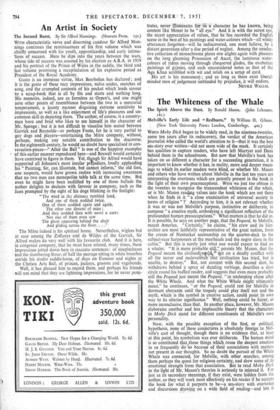An Artist in Society
The Second Burst. -By Sir Alfred Munnings. (Museum Press. ass.) WrrH characteristic verve and disarming candour Sir Alfred Mun- nings continues the reminiscences of his first volume which was chiefly concerned with his youth, apprenticeship, and early intima- - lions of success. Here he dint into the years between the wars, whose tide of success was assured-by his election as A.R.A. in 1919 -and his portrait of the Prince of Wales in the saddle, the third and fast volume promising a recapitulation of his explosive period at President of the Royal Academy. ' Gusto is an immense virtue, Max Beerbohm has declared and • It is the gusto of these racy impressions, naive, asides, snatches of song, and the crumpled contents of his pocket which lends savour 'to a scrap-book that is all by fits and starts and nothing long. His memoirs, indeed, are as formless as Orpen's, and one might note other points of resemblance between the two in a mercurial temperament, a jaunty manner disguising extreme sensitivity to impressions, as well as a like enjoyment of life's pleasures and un- common skill in depicting them. The author, of course, is a country- man born and bred who likes to see himself in the character of Mr. Sponge ; but it is not difficult to visualise him seated between Garrick and Reynolds—or perhaps Foote, for he is very partial to gay dogs and players—entertaining the Mitre company, without, perhaps, making any notable contribution to the discourse. In the eighteenth century, he would no doubt have specialised in con- versation-pieces—" After the Ball" is one of the happiest examples • bf this earlier manner reproduced here—and Boswell would certainly have contrived to figure in them. Yet, theugh Sir Alfred would have Supported all Johnson's most insular prijudices, loudly applauding • his "Painting, Sir, can illustrate, but cannot inform," the old lion, one suspects, would have grown restive with increasing awareness That no two men can monopolise table talk at the same time. But even he might have been mollified by one of those ballads the -author delights to declaim with fervour in company, such as the lines prompted by the sight of his dogs blinking in the firelight: "The wind in tha chimney rumbled loud,
And one of them nodded twice, One of them nodded again and again, The other une dreamt of mice ; And they nodded then with never a care: Not one of them even saw The ghost appearing behind the chair And gliding across the floor. . . ."
The Mitre indeed is his spiritual home. Nevertheless, wigless but at ease among the Zoffanys and de Wildes of the Garrick, Sir Alfred makes do very well with his favourite club. And it is here, in congenial company, that he must have related, many times, these impressions jotted down here in staccato sentences: of steeplechases and the Slumbering Stour, of half the peerage sitting in white breeches _ astride his studio saddle-horse, of days on Exmoor and nights at the Chelsea Arts Ball, of princes, jockeys, grooms and vagabonds. Well, it has pleased him to,record them, and perhaps his friends • Will not mind that they are lightning impressions, for he never penp- trates, never-Mbininates f6r--us"-a—character he has known, being content like Monet to be "all eye." And it is with the surest eye, the nicest appreciation of values, that he has recorded the English scene in the best of his paintings and water-colours which—all windy utterances forgotten—will be rediscovered, one must believe, by a distant generation after a due period of neglect. Among the unselec- tive collection of nionochrome plates one alights again with pleasure on the long gleaming Procession of Ascot, the luminous water- colours of riders moving through chequered glades, the exuberant paintings of gypsies, and such unconsidered notes as that of the Aga Khan scribbled with wit and relish on a scrap of card.
• His art is his monument ; and so long as there exist liberal- minded men of judgement tinblinded by prejudice, it will endure.


















































 Previous page
Previous page